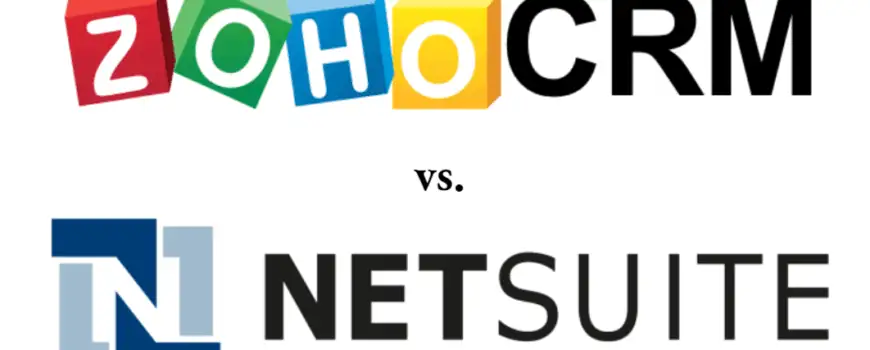Zoho vs. NetSuite: Choosing the Right Business Software

Businesses of all sizes and industries operate efficiently with the help of Customer Relationship Management (CRM) software. From closing deals to managing budgets to juggling the schedules of multiple field technicians, these magical pieces of software help CEOs everywhere rest easy with invaluable automations. However, how do you decide which CRM is right for you? Choosing a CRM that works best for your business is no easy task; but, we aim to ease your concerns, answer your questions, and illustrate the pros and cons of two different software packages in this comparison article. Read on to discover the details of Zoho CRM vs. NetSuite: how they are similar, how they are different, and they affect the bottom line for your company.The difference is that when you combine Zoho with our Zoho ERP the result is better than NetSuite because our solution incorporates a full end to end business engine into a single Zoho app suite.
Overview:
Zoho:
- Zoho stands out for its affordability and versatility, offering a diverse range of applications, from CRM to finance.
- It caters primarily to small to medium-sized businesses, providing them with cost-effective solutions.
- Additionally, Zoho boasts a user-friendly interface and customizable features.
NetSuite:
- NetSuite, on the other hand, is a comprehensive, cloud-based ERP solution designed to cater to larger enterprises.
- Renowned for its scalability and robust financial management capabilities, NetSuite is a preferred choice for corporations.
- NetSuite offers a plethora of modules, including ERP, CRM, and e-commerce, making it a one-stop solution for enterprises.
Features Comparison:
- Pricing:
- Zoho typically offers more budget-friendly pricing options, making it accessible to startups and small businesses.
- In contrast, NetSuite is known for its higher price point, which is more suitable for larger enterprises.
- Scalability:
- Zoho allows for scalability as your business expands, although it may have limitations when it comes to accommodating the needs of large enterprises.
- NetSuite, on the other hand, is highly scalable and can seamlessly adapt to the growth of your organization.
- Integration:
- Zoho offers integration with a wide range of third-party applications, providing you with unmatched flexibility.
- In contrast, NetSuite boasts native integration capabilities, significantly reducing the dependence on third-party integrations.
- Customization:
- Both platforms provide customization options; however, Zoho is renowned for its user-friendly customization features.
- In contrast, NetSuite offers extensive customization capabilities but may require a higher level of technical expertise.
- Support and Training:
- Zoho ensures adequate customer support and offers various training resources to facilitate your software adoption journey.
- NetSuite, on the other hand, excels in providing robust customer support and comprehensive training, which is essential for complex deployments.
Zoho vs NetSuite CRM Usability
A program’s ease of use significantly influences customer opinion of that software. This is so because a clunky UI can be incredibly frustrating and ultimately destroy buy-in for that software. Unfortunately, many NetSuite users have voiced their displeasure with the UI, commenting on it feeling outdated and depressing. You can read their thoughts on Oracle NetSuite, both good and bad here. Other complaints from NetSuite customers reference the subpar search function, noting how difficult it is to find things and how the CRM is not intuitive. Last but not least, NetSuite has built a reputation for not integrating well with other systems.
By contrast, Zoho CRM is known for having a user friendly interface and marries all of its applications very well. Plus, if Zoho customers encounter any issues, we at ZBrains are here to help. Our team aims to please, as evidenced by our collection of useful integrations:
Winner: Zoho CRM
Ultimately, the frequency of user complaints about NetSuite gives Zoho the edge here.
Overall Value of the CRM
When discussing the overall value of Zoho vs NetSuite, it’s important to note that NetSuite carries the Oracle name. This distinction, in turn, makes the software more expensive. Although on the surface the applications within both CRMs appear to be the same, one can purchase Zoho for considerably less.
Also noteworthy in this category are the complaints of NetSuite users, who grumble about the CRM out of the box. Multiple users mentioned the hassle of having to buy more add-ins just to get the essentials of the software to function properly. This folds into an often overlooked cost, the implied cost. We will go into implied cost in more detail in a future article, but in essence, NetSuite support plans post launch are likely very expensive, requiring a NetSuite (Oracle) resource that is pricier in the long term.
Explained further, NetSuite is an ERP solution that has all the big-box player financial tools out of the box, as well as several integrations. On the other hand, Zoho out of the box does not have full ERP functionality, but it can be augmented quickly and cost effectively when combined with our Zoho ERP. The difference is that when you combine Zoho with our Zoho ERP the result is better than NetSuite because our solution incorporates a full end to end business engine into a single Zoho app suite.
Winner: Zoho CRM
Zoho tops NetSuite in this category, in particular because of the required add-ons you need for NetSuite in conjunction with the implied costs of future support.
This is part one of a two-part series. Click here for more analysis in part two.


